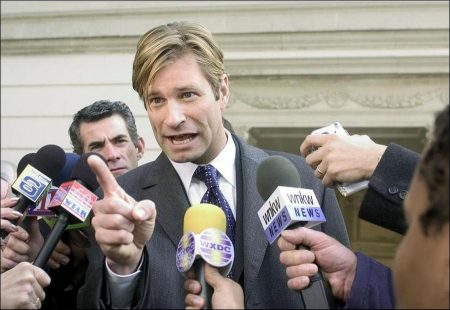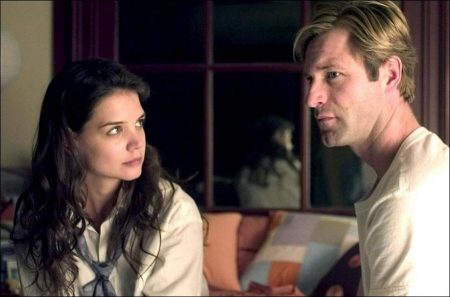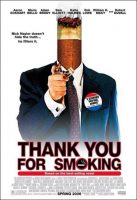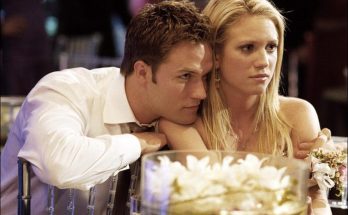Taglines: If we can reach just one child, it was worth it.
Based on Christopher Buckley’s acclaimed 1994 novel of the same title and adapted for the screen by Jason Reitman, Thank You For Smoking is a fiercely satirical look at today’s “culture of spin.” The hero of Thank You For Smoking is Nick Naylor (Aaron Eckhart), chief spokesman for Big Tobacco, who makes his living defending the rights of smokers and cigarette makers in today’s neo-puritanical culture.
Confronted by health zealots out to ban tobacco and an opportunistic senator (Willam H. Macy) who wants to put poison labels on cigarette packs, Nick goes on a PR offensive, spinning away the dangers of cigarettes on TV talk shows and enlisting a Hollywood super-agent (Rob Lowe) to promote smoking in movies.
Nick’s newfound notoriety attracts the attention of both tobacco’s head honcho (Robert Duvall) and an investigative reporter for an influential Washington daily (Katie Holmes). Nick says he is just doing what it takes to pay the mortgage, but the increased scrutiny of his son (Cameron Bright) and a very real death threat may force him to think differently.
Thank You for Smoking is a 2006 comedy-drama film written and directed by Jason Reitman and starring Aaron Eckhart, based on the 1994 satirical novel of the same name by Christopher Buckley. It follows the efforts of Big Tobacco’s chief spokesman, Nick Naylor, who lobbies on behalf of cigarettes using heavy spin tactics while also trying to remain a role model for his 12-year-old son. Maria Bello, Adam Brody, Sam Elliott, Katie Holmes, Rob Lowe, William H. Macy, J. K. Simmons, and Robert Duvall appear in supporting roles.
The film was released in a limited run on March 17, 2006, and had a wide release on April 14. As of 2007, the film has grossed a total of more than $39 million worldwide.[3] The film was released on DVD in the US on October 3, 2006, and in the UK on January 8, 2007.
Occasions of Spin
Thank You For Smoking (the book, that is) was born one night in 1992 some time between 7 and 8pm. I can pinpoint it this precisely because that’s when the (as it was then called) “MacNeil-Lehrer News Hour” aired. On this particular night, a young lady from the (now defunct) Tobacco Institute was a guest. It fell to her to contradict the other guest, a Ph. D working for a prestigious research institute. The institute had just come up with yet another piece of evidence that smoking was – hel-lo – bad for you.
The lady from the Tobacco Institute was having none of it. She parried and thrusted, challenged every calm statement the Ph. D made. I was mesmerized. Finally she said, as if intellectually annoyed at having to state the obvious, “All I’m saying is – where is the data? Show us the data.”
It was love at first sight. I thought, What an interesting job that must be.
Get up mornings, brush your teeth, have breakfast, kiss the kids and go off and sell – death. Thus was born Nick Naylor of the Academy of Tobacco Studies.
What she was doing, of course, was what we now recognize as “spinning.” The dictionary defines it: “Verb and noun. To convey information or cast another person’s remarks or actions in a biased or slanted way so as to favorably influence public opinion; information provided in such a fashion.” A more concise definition might be: “Verb and noun. B——t.” Either way, it is all around us now. We live in a world of spin on a spinning planet.
The other night on TV came the news that producers of junk food spend $10 billion a year advertising their products at – it’s a great country – kids between the ages of 2 and five. As if on cue, on came a spokesman from the – let’s call it – Association of Foods With Absolutely Zero Nutritional Value. He said, “Actually, we’re proud of the fact that we are reducing our advertising budget for this market sector by as much as 6 percent.” Well, that’s a relief.
The week before, the big story was that the Pentagon is planting favorable news articles in the Iraqi press. (I myself am all in favor of anything that will get us the heck out of there, and if Iraqi editors need to be bribed to print a bit of cheery news, I say it’s money well spent.) At any rate, this development was revealed by the Los Angeles Times, which wittily quoted an Iraqi newspaper editor saying that “if his cash-strapped paper had known that these stories were from the U.S. government, he would have ‘charged much, much more’ to publish them.”
Jacob Weisberg of Slate magazine points out in a fine huffy piece on the subject that President Bush’s so-called “town meetings” are packed with pre-screened friendlies whose hardest-hitting questions are likely to be: “Mr. President, do you wear briefs or boxers?” It’s rather sad that it’s come to this. The current administration has also been caught paying commentators to promote their policies. I don’t think they teach that at journalism school. But then the whole global culture seems to be degraded and corrupt. A year ago, it was revealed that a British novelist had accepted money from a maker of vodka to mention it throughout her next book. Product placement — in novels. Why didn’t I think of that?
Call me Ishmael. Whenever it is a damp, drizzly November in my soul, I like to brew up a cup of hot, delicious Campbell’s clam chowder … “Spin” is now such a commonplace word that it’s hard to remember when it first arrived on the scene. Linda Wertheimer of National Public Radio asserts that it happened in 1984, following the presidential debate between Ronald Reagan and his challenger, Walter Mondale. Both candidates’ staff – as well as high-profile supporters brought in as cheerleaders – rushed to the microphones outside the debating hall to proclaim victory. Reagan’s performance had been, in the words of one of his aides, “a disaster,” but his campaign manager, the legendary late Lee Atwater said, “We’re going to want to go out there and spin this afterward.” A subsequent New York Times editorial coined the term “Spin Doctors.”
I did a little more digging – actually, now I’m spinning you…. All I did was Google “spin origins of” and within about 1.3 seconds I was connected to a delightful website called Word Spy. According to Word Spy, the very first citation of the word “spin” occurred before the Reagan-Mondale debate, in an article in The Washington Post in 1977. This was the citation:
“What Pertschuk is accused of is being too ardent a consumer advocate, of ‘lobbying’ members of the committee on behalf of things he thinks are good, of putting his own philosophical ‘spin’ on options, of having excessive influence on Magnuson; in short of acting like the ‘101st senator.'”
[Spencer Rich, “An Invisible Network of Hill Power,” The Washington Post, March 20, 1977]
The name Pertschuk rang a distant bell. I re-Googled and … what do you know: he was the righteous, hall-monitor-like head of the U.S Federal Trade Commission. He was so insufferable he was ultimately forced to resign.
And what did he do then? He became the leader of the anti-smoking lobby. Full circle spin. Enjoy the movie. Turn off your cell phones. And as Mr. Pertschuk would say, “No smoking!”
Director’s Statement
By Writer / Director Jason Reitman
I tried coming up with an opening statement that reflects my feelings for the production of THANK YOU FOR SMOKING. Perhaps I was overwhelmed, but I couldn’t come up with anything profound – certainly not after reading Buckley’s piece on creating Nick Naylor. I mean, f***, how am I supposed to follow that? Instead, I have decided to present you with five moments of making this film that I will never forget.
1. The moment I discovered the book.
I was standing in a friend’s living room. The book was a gift from a six foot woman with a degree from Yale. I opened the book and read the first sentence – “Nick Naylor had been called many things since becoming the chief spokesman for the Academy of Tobacco Studies, but until now no one had actually compared him to Satan.”
It’s said that when a woman meets her future husband for the first time, she can see their entire life together – Love, marriage, kids, the whole thing. That’s the only way I can describe the first time I read that line. I saw Nick spraying out words like a machine gun. I saw him hitting a home run in the middle of the night. I saw him offering a light to the world while draped in the American flag. It was love at first sight.
2. A call from way upon high.
After begging for the job and writing the first act on spec, Mel Gibson’s Icon Productions hired me to take a crack at THANK YOU FOR SMOKING. They paid me scale. They could have paid me nothing. I turned in my draft and received no notes. Not a thing. This may seem like a good thing, but what it really means is they don’t know what to do with it.
One day, my cell phone rings. It’s Mel. Calling from his plane. He tells me how much he enjoyed my draft. He then goes on for about twenty minutes on the virtues of digital filmmaking. He tells me how excited he is to make my film. I never speak to him again.
3. I meet my white knight.
I knew two things about David Sacks before I met him. He orchestrated the $1.5 billion sale of his company PayPal to eBay… and he loves my screenplay. I went to meet him at his new place in the hills. He had bought the house featured in the film Pulp Fiction, but had yet to buy furniture. Just so we’re clear, after arriving in Los Angeles, he had gone shopping for a screenplay before shopping for a bed.
We sat on folding chairs in front of an infinity pool that carried views from Downtown to the Pacific. About halfway through the meeting, he started peeling off the loose rubber from the soles of his shoes. I made some remark about him using his newfound fortune to go down to Rodeo and buy a new pair. He looked back at me and said, “Hey, what you see is what you get.”
4. Lunch with Sam
Halfway through the casting process, I receive word that Sam Elliott is willing to sit down and discuss the character of Lorne Lutch. I had written him a letter, expressing my admiration for him and passion for him to play the part. I basically wrote that I could never be happy with the film, knowing that another actor was in his role.
I went to meet him in Malibu amidst the heavy rains of late 2004. His neighbor’s roof had caved in the middle of the night and he had spent every hour since then fixing it. He is the closest thing to the noble cowboy that I’ve ever met. He is Shane.
For close to three hours we debated whether or not his character should take the money. I almost found myself in the role of Nick Naylor, trying to convince him to do it. After a while, we settled on his character taking the payoff as written. With one stipulation. Instead of Lorne carrying a shotgun, as described in the book, he preferred the character to have a rifle. Fine.
We get to the day of shooting and I have completely forgotten about the choice of firearms. I’m eating breakfast, when I’m told that props would like to see me per choosing the gun. I get to the prop truck and the property master is standing above two shotguns and a rifle. Thank God. Sam happens to be there as well.
He picks up the rifle.
I asked, “Will this work for you?”
He responds, “Sure.”
I continued, “Do you need them to show you how it works?”
He gives me a look, then says “Of course not. It’s my gun.”
5. Guerilla Filmmaking in our nation’s capital
Directing commercials has afforded me the chance to shoot around the world. I’ve shot in the suburbs of London, in the back alleys of Capetown, and a defunct mining village in rural Mexico with one telephone. However, nothing is quite like shooting post 9/11 D.C.
At one point during our location scout, I saw a building I liked as a possible exterior for the Academy of Tobacco Studies. Against my location manager’s wishes, I had the van make a sudden impromptu stop. We hopped out and started taking photos. We were about to leave when six men in flak jackets surrounded the van and began to question us. A man in a khaki overcoat took our location manager aside and began violently scolding him.
The building was the Department of Energy. They’re like my uncle Barry. They don’t like to be photographed with out being asked. That said, we ended up shooting there. The D.O.E. did in fact become the Tobacco Academy with a clever use of CG to redo the sign out front. If you look closely at the scene of Nick entering the building after returning from Winston-Salem, you’ll see a young woman in a blue jacket walking through frame. You see, the man in the khaki overcoat was the head of security for the D.O.E. And his daughter wants to be an actress.
Thank You for Smoking (2006)
Directed by: Jason Reitman
Starring: Aaron Eckhart, Maria Bello, Cameron Bright, Adam Brody, Sam Elliott, Katie Holmes, David Koechner, Rob Lowe, Marianne Muellerleile, Courtney Taylor Burness
Screenplay by: Jason Reitman
Production Design by: Steve Saklad
Cinematography by: Jim Whitaker
Film Editing by: Dana E. Glauberman
Costume Design by: Danny Glicker
Set Decoration by: Kurt Meisenbach
Music by: Rolfe Kent
MPAA Rating: R for language and some sexual content.
Distributed by: Fox Searchlight Pictures
Release Date: March 17, 2006
Visits: 28





